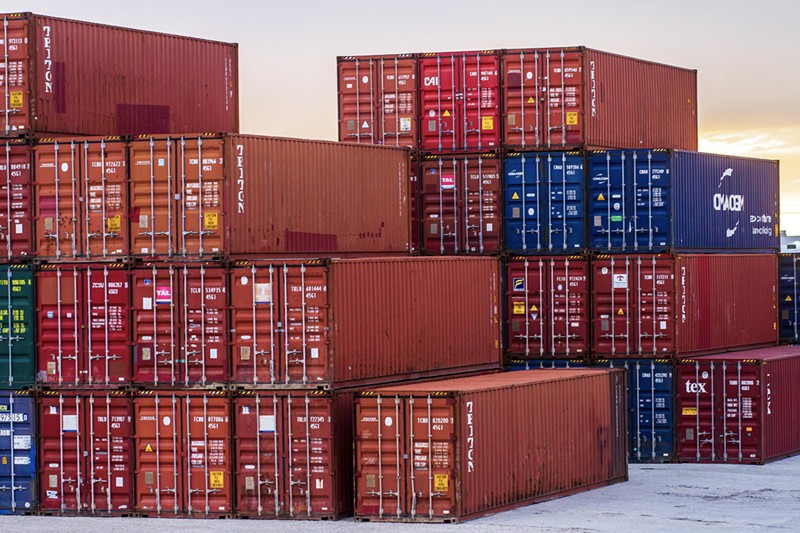It's only 246 miles from Dallas to the Port of Houston, but North Texas is unlikely to feel severe, immediate effects from the ongoing dockworkers' strike that has closed U.S. ports from Maine to the Gulf Coast and cut off much of the flow of goods arriving into the U.S. If the strike had occurred on the West Coast, however, things here might be worse.
"Don't California my Texas," you say? Sorry, bubba. It's too late, at least when it comes to supply chains.
"The Dallas-Fort Worth area, although we are a large intermodal hub, and really we're becoming the distribution center for North America, when you look at freight volumes and things like that, most of the freight that comes into this market comes in from the West Coast," says Dr. Terry Pohlen, professor, senior associate dean and director of the Jim McNatt Institute for Logistics Research at the University of North Texas' G. Brint Ryan College of Business. "...The containers that come into Houston mostly stay in that market."
Dockworkers at the ports of Los Angeles and Long Beach, more than 1,400 miles away, aren't on strike, so for now Dallas isn't feeling pinched by the shutdown of the port just down the road on Interstate 45.
But if the strikes goes on for very long on the East Coast, worse will come our way and everyone else's.
That Dallas and Forth Worth serve as the distribution point for California but not Houston sounds counterintuitive, but the reason is straightforward: money. Assembling a freight train and loading it with containers off a ship is expensive, so long trains carrying huge numbers of containers greater distances are much more cost-effective, Pohlen says.
Some of today's freight trains run 1 to 3 miles in length, which has become a problem for rural towns split by rail lines, where long trains can halt traffic, cut off ambulances and firetrucks and sometimes prompt schoolchildren to scoot underneath stopped railcars to get to class. If you've driven along Interstate 10 to points out west, you may have seen some of these massive trains moving parallel to the freeway, possibly rolling to Dallas or Fort Worth.
Bad for those small towns, maybe, but good for a city that sits at the crossroads of major interstate freeways, is home to two large airports and is serviced by three major rail lines. But even with Dallas' ready access to the rest of the country, putting together a massive train to haul freight the relatively short distance from Houston to Dallas doesn't work economically, Pohlen says.
The East Coast strike also isn't likely to soon hurt manufacturers based in Dallas and Fort Worth who need to ship products out, Pohlen says. Much of what's made here is high-end, expensive electronics, light enough and valuable enough to be shipped by air, which helps explain why Perot Field Fort Worth Alliance Airport is ranked in the top 20 airports for air freight.
All this means North Texas' economy might not be hurt badly if the strike ends quickly.
Retailers have been stocking up on inventory and shipping volumes have increased as businesses braced for the potential strike, Pohlen says. But there's only so much warehouse space to store all that inventory, and manufacturing supply chains are a complex web, with businesses here reliant on goods arriving from all corners of the globe, not all of it moving through West Coast ports. Fresh produce shipped from South America — bananas, for example — also arrive via Atlantic ports, so they might be among the first things we see running short.
After that? "Two or three weeks, and everybody's going to feel it," Pohlen says.
"Everybody" includes the man sitting in the White House and the vice president hoping to replace him.
With a presidential election coming in November, even union-friendly President Joe Biden might not stay on the sidelines for a prolonged strike whose economic effects would not improve his party's chances nor help unions that benefit from a Democratic administration. Biden has said that he won't act under federal laws that allow him to order the striking longshoremen back to work and he stands behind the union's demands for higher wages and limits on automation that its members fear could take away jobs. Added to that, union support in Midwestern states could be key to getting Democrats enough electoral votes to keep the White House.
But give it time, and the political calculation could change. Pohlen thinks that if the strike extends beyond a couple of weeks, Biden likely will act.
"You can't just allow the economy to suffer," he says. "You can let inflation run rampant."
According to CNBC, "The International Longshoremen’s Association, the largest maritime union in North America ... wants a $5 an hour per year increase over six years, all royalties for containers handled, and strict language against automation."
Pohlen says the issue of automation could be an area ripe for bargaining. Using high tech to move goods off and on ships more efficiently with less human labor means greater efficiency and lower shipping costs, so in a competitive world, it appears inevitable. But humans will still be needed to maintain and operate that tech, which will require a higher-skilled, higher-paid workforce. Ensuring union members get trained for those jobs would be a smart bargaining point for the union, he suggests.
"Let's not put our head in the sand and say these things are not going to occur," Pohlen advises.

Audio By Carbonatix
[
{
"name": "Air - MediumRectangle - Inline Content - Mobile Display Size",
"component": "18855504",
"insertPoint": "2",
"requiredCountToDisplay": "2",
"watchElement": ".fdn-content-body",
"astAdList": [
{
"adType": "rectangle",
"displayTargets": "mobile"
}
]
},{
"name": "Editor Picks",
"component": "17105533",
"insertPoint": "4",
"requiredCountToDisplay": "1",
"watchElement": ".fdn-content-body",
"astAdList": [
{
"adType": "rectangleLeft",
"displayTargets": "desktop|tablet"
},{
"adType": "rectangleRight",
"displayTargets": "desktop|tablet|mobile"
}
]
},{
"name": "Inline Links",
"component": "18349797",
"insertPoint": "8th",
"startingPoint": 8,
"requiredCountToDisplay": "7",
"maxInsertions": 25
},{
"name": "Air - MediumRectangle - Combo - Inline Content",
"component": "17105532",
"insertPoint": "8th",
"startingPoint": 8,
"requiredCountToDisplay": "7",
"maxInsertions": 25,
"watchElement": ".fdn-content-body",
"astAdList": [
{
"adType": "rectangleLeft",
"displayTargets": "desktop|tablet"
},{
"adType": "rectangleRight",
"displayTargets": "desktop|tablet|mobile"
}
]
},{
"name": "Inline Links",
"component": "18349797",
"insertPoint": "8th",
"startingPoint": 12,
"requiredCountToDisplay": "11",
"maxInsertions": 25
},{
"name": "Air - Leaderboard Tower - Combo - Inline Content",
"component": "17105535",
"insertPoint": "8th",
"startingPoint": 12,
"requiredCountToDisplay": "11",
"maxInsertions": 25,
"watchElement": ".fdn-content-body",
"astAdList": [
{
"adType": "leaderboardInlineContent",
"displayTargets": "desktop|tablet"
},{
"adType": "tower",
"displayTargets": "mobile"
}
]
}
]












